英语语法之数量限定词
- 格式:pptx
- 大小:121.65 KB
- 文档页数:14
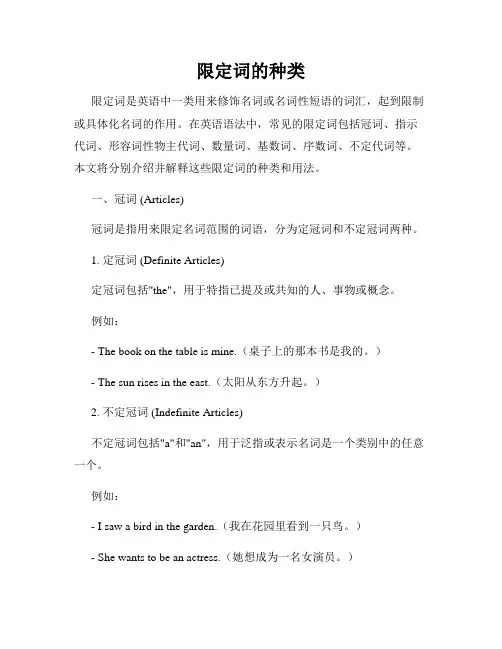
限定词的种类限定词是英语中一类用来修饰名词或名词性短语的词汇,起到限制或具体化名词的作用。
在英语语法中,常见的限定词包括冠词、指示代词、形容词性物主代词、数量词、基数词、序数词、不定代词等。
本文将分别介绍并解释这些限定词的种类和用法。
一、冠词 (Articles)冠词是指用来限定名词范围的词语,分为定冠词和不定冠词两种。
1. 定冠词 (Definite Articles)定冠词包括"the",用于特指已提及或共知的人、事物或概念。
例如:- The book on the table is mine.(桌子上的那本书是我的。
)- The sun rises in the east.(太阳从东方升起。
)2. 不定冠词 (Indefinite Articles)不定冠词包括"a"和"an",用于泛指或表示名词是一个类别中的任意一个。
例如:- I saw a bird in the garden.(我在花园里看到一只鸟。
)- She wants to be an actress.(她想成为一名女演员。
)二、指示代词 (Demonstrative Pronouns)指示代词指代特定的人、事物或位置,并且根据离说话人的距离分为远指和近指两种。
1. 远指代词远指代词包括"that"和"those",用于指代离说话人较远的事物或人们。
例如:- That is a beautiful sunset.(那是一个美丽的日落。
)- Look at those flowers over there.(看看那边的花。
)2. 近指代词近指代词包括"this"和"these",用于指代离说话人较近的事物或人们。
例如:- This is my new car.(这是我的新车。
)- These are my friends.(这些是我的朋友。
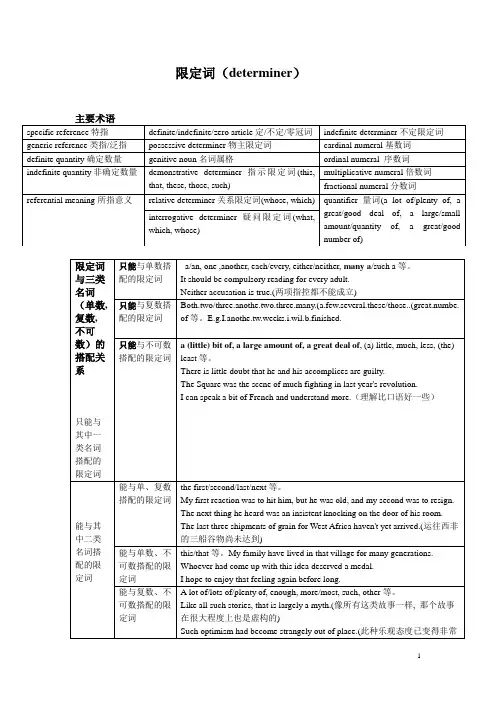
限定词(determiner)限定词的先后顺序: 前位---中位---后位(一个名词中心词之前不可并用两个前位限定词或两个中位限定词)冠词的表意功能(1)The ten of them have passed the final examination.Ten of them have passed the final examination.Ten of the (these/his) students have passed the final examination.(2)They asked to stop counting presidential votes for a second time.(3)Every boy and every girl___(have) his merits.Every young man, young lady,and child ___(be) requested to take part.Many a person___(be) going to the take the test.(4)Other or anotherCalifornia covers a large area than __________state except Alaska and Texas.Out of the three foreign guests, one is from Frankfurt, ______two are from Vienna.. Don'.los.heart.Hav.___try.There's room for _________people in the back of the bus.(5). ing.We'l.hav.____.five-da.holiday.(6)冠词的用法Who is ___captain of your team?. Mr.Reaga.wa.electe.___Presiden.o.th.Unite.State.i.1980.Charles Dickens,__author of David Copperfield, was a distinguished English novelist.As ____physician, he does not deserve much praise.He was covered with snow from ___head to __foot.The relation between ___teacher and ___student is excellent.This room serves the triple purpose of ___study, ___bedroom and ____sitting room. The old man was sitting in a chair, ___pipe in ___hand.He sat at ___ table, ___coat off, ___head down, and __pen in ___hand.What kind of ___man is he?What sort of ___book do you want?The work is ____pleasure to me.She has developed ___love for labour.Physics is ____ science.He spoke with _____ enthusiasm which inspired us all.Do you like ___ music of ___film?Phonetics is ____science of speech sounds。
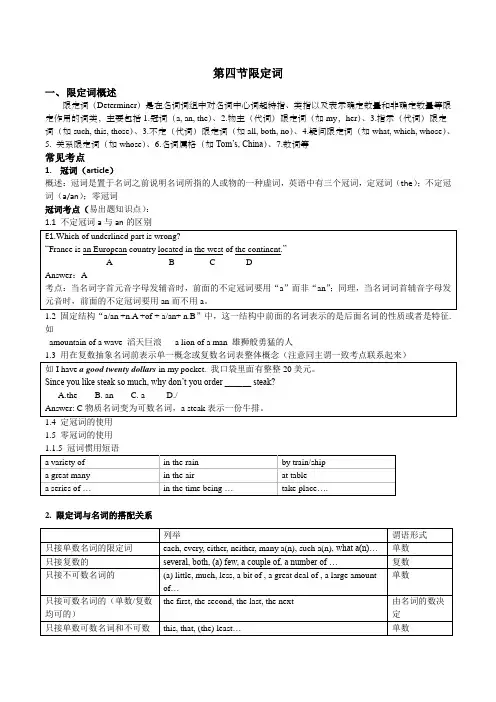
第四节限定词一、限定词概述限定词(Determiner)是在名词词组中对名词中心词起特指、类指以及表示确定数量和非确定数量等限定作用的词类,主要包括1.冠词(a, an, the)、2.物主(代词)限定词(如my,her)、3.指示(代词)限定词(如such, this, those)、3.不定(代词)限定词(如all, both, no)、4.疑问限定词(如what, which, whose)、5. 关系限定词(如whose)、6.名词属格(如Tom’s, China)、7.数词等常见考点1.冠词(article)概述:冠词是置于名词之前说明名词所指的人或物的一种虚词,英语中有三个冠词,定冠词(the);不定冠词(a/an);零冠词冠词考点(易出题知识点):1.1 不定冠词a与an的区别1.2 固定结构“a/an +n.A +of + a/an+ n.B”中,这一结构中前面的名词表示的是后面名词的性质或者是特征. 如amountain of a wave 滔天巨浪 a lion of a man 雄狮般勇猛的人1.3 用在复数抽象名词前表示单一概念或复数名词表整体概念(注意同主谓一致考点联系起来)如I have a good twenty dollars in my pocket. 我口袋里面有整整20美元。
Since you like steak so much, why don’t you order ______ steak?A.theB. anC. aD./Answer: C物质名词变为可数名词,a steak表示一份牛排。
1.4 定冠词的使用1.5 零冠词的使用2. 限定词与名词的搭配关系3.限定词与限定的之间的搭配关系3.2 多个限定词相遇时,其位置使用规则*基本规则:“前位+中位+后位”both the brothers all his two daughters (前+中+后)all other students (前+后) those last few minutes (中+后+后)*such做限定词有特殊规则:such+不定冠词(such位于前)当such 和其他的限定词(some, any, no, fall, few, another, other, many, one, two等)搭配时,such是后位限定词,如I’ve never seen such a dog.All such problems should be considered.4. 特殊限定词的使用4.1some 和any 的用法1)some, any与复数名词和不可数名词搭配,表“一些”some 和单数名词搭配表“某一”any与单数名词搭配表“任一”2)some一般用于肯定句中,也可以用在表示希望对方给出肯定回答的疑问句中any 多用语疑问,否定句,条件句,if/whether引导的从句3)固定搭配some day 来日some day or other 迟早not…any longer/more 不再at any rate/in any case 无论如何4.2no 的用法1)no可以修饰单数可数名词,复数名词和不可数名词,其意义相当于“not a “ “not any”, 所以no不能和a(n), any 连用。
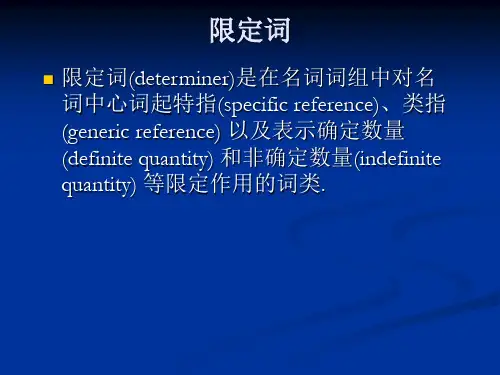
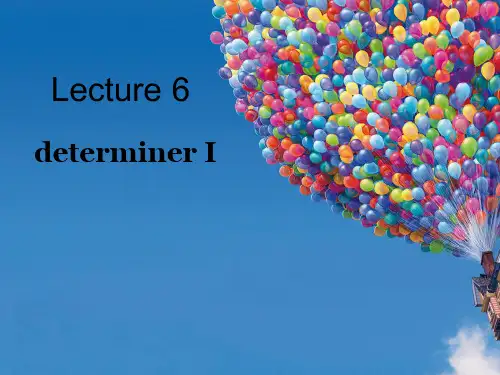
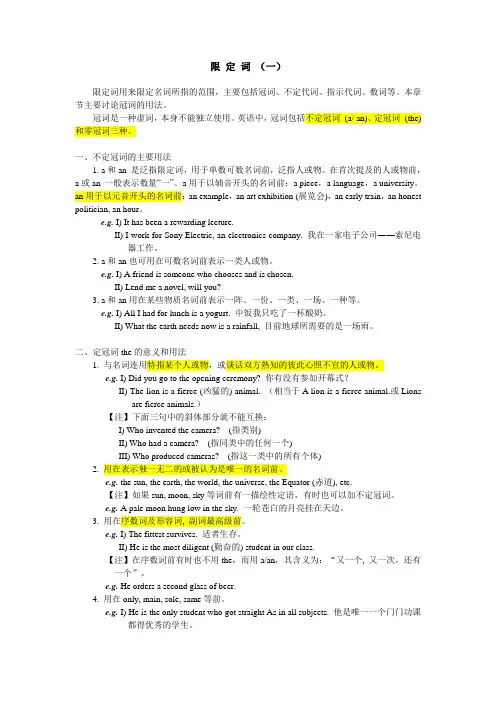
限定词(一)限定词用来限定名词所指的范围,主要包括冠词、不定代词、指示代词、数词等。
本章节主要讨论冠词的用法。
冠词是一种虚词,本身不能独立使用。
英语中,冠词包括不定冠词(a/ an)、定冠词(the) 和零冠词三种。
一、不定冠词的主要用法1. a和an 是泛指限定词,用于单数可数名词前,泛指人或物。
在首次提及的人或物前,a或an 一般表示数量“一”。
a用于以辅音开头的名词前:a piece,a language,a university。
an用于以元音开头的名词前:an example,an art exhibition (展览会),an early train,an honest politician, an hour。
e.g. I) It has been a rewarding lecture.II) I work for Sony Electric, an electronics company. 我在一家电子公司――索尼电器工作。
2. a和an也可用在可数名词前表示一类人或物。
e.g. I) A friend is someone who chooses and is chosen.II) Lend me a novel, will you?3. a和an用在某些物质名词前表示一阵、一份、一类、一场、一种等。
e.g. I) All I had for lunch is a yogurt. 中饭我只吃了一杯酸奶。
II) What the earth needs now is a rainfall, 目前地球所需要的是一场雨。
二、定冠词the的意义和用法1. 与名词连用特指某个人或物,或谈话双方熟知的彼此心照不宣的人或物。
e.g. I) Did you go to the opening ceremony? 你有没有参加开幕式?II) The lion is a fierce (凶猛的) animal. (相当于A lion is a fierce animal.或Lions are fierce animals.)【注】下面三句中的斜体部分就不能互换:I) Who invented the camera? (指类别)II) Who had a camera? (指同类中的任何一个)III) Who produced cameras? (指这一类中的所有个体)2. 用在表示独一无二的或被认为是唯一的名词前。
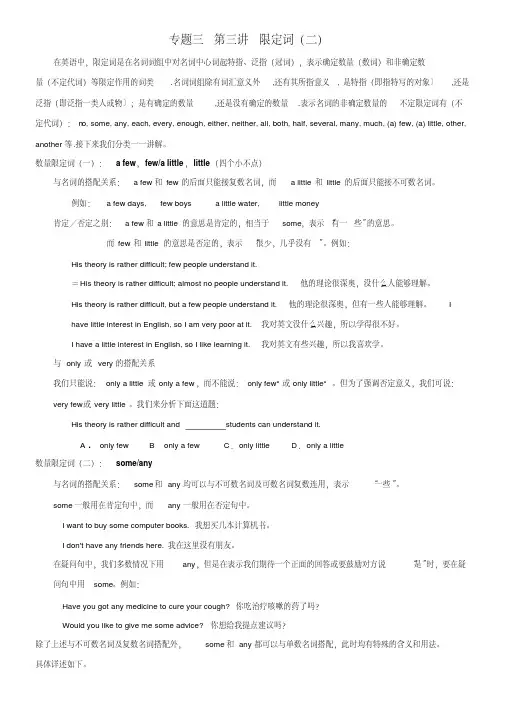
专题三第三讲限定词(二)在英语中,限定词是在名词词组中对名词中心词起特指、泛指(冠词),表示确定数量(数词)和非确定数量(不定代词)等限定作用的词类.名词词组除有词汇意义外,还有其所指意义, 是特指(即指特写的对象〕,还是泛指(即泛指一类人或物〕;是有确定的数量,还是没有确定的数量.表示名词的非确定数量的不定限定词有(不定代词):n o, some, any, each, every, enough, either, neither, all, both, half, several, many, much, (a) few, (a) little, other, another 等.接下来我们分类一一讲解。
数量限定词(一): a few,few/a little,little(四个小不点)与名词的搭配关系: a few 和few 的后面只能接复数名词,而 a little 和little 的后面只能接不可数名词。
例如: a few days, few boys a little water, little money肯定/否定之别: a few 和a little 的意思是肯定的,相当于some,表示“有一些”的意思。
而few 和little 的意思是否定的,表示“很少,几乎没有”。
例如:His theory is rather difficult; few people understand it.=His theory is rather difficult; almost no people understand it. 他的理论很深奥,没什么人能够理解。
His theory is rather difficult, but a few people understand it. 他的理论很深奥,但有一些人能够理解。
Ihave little interest in English, so I am very poor at it. 我对英文没什么兴趣,所以学得很不好。
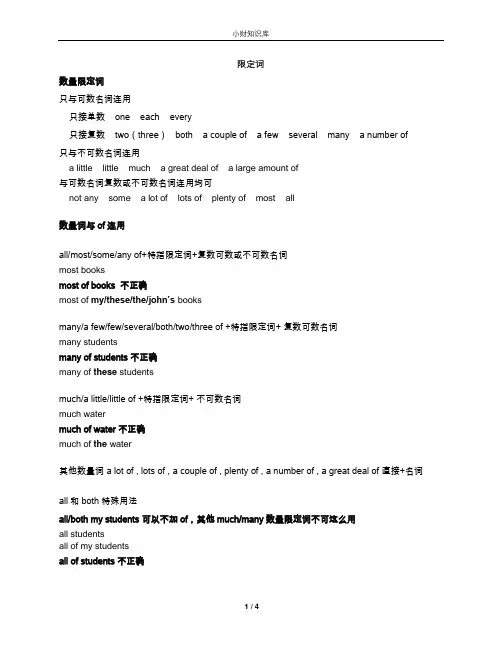
限定词数量限定词只与可数名词连用只接单数 one each every只接复数 two(three) both a couple of a few several many a number of只与不可数名词连用a little little much a great deal of a large amount of与可数名词复数或不可数名词连用均可not any some a lot of lots of plenty of most all数量词与of连用all/most/some/any of+特指限定词+复数可数或不可数名词most booksmost of books 不正确most of my/these/the/john’s booksmany/a few/few/several/both/two/three of +特指限定词+ 复数可数名词many studentsmany of students 不正确many of these studentsmuch/a little/little of +特指限定词+ 不可数名词much watermuch of water 不正确much of the water其他数量词 a lot of , lots of , a couple of , plenty of , a number of , a great deal of 直接+名词all和both特殊用法all/both my students 可以不加of,其他much/many数量限定词不可这么用all studentsall of my studentsall of students 不正确数量词a few, few(只接可数), a little, little(只接不可数)a little,a few为肯定之意,等同于some,有一些His theory is rather difficult; few people understand it.=almost no people understand it.I have little interest in English, so I am very poor at it.little,few为否定之意,等同于几乎没有His theory is rather difficult, but a few people understand it.I have a little interest in English, so I like learning it.only a little,only a few very few,very littlesome and any陈述句:some 一般用肯定,any一般用否定,表示”一些“。
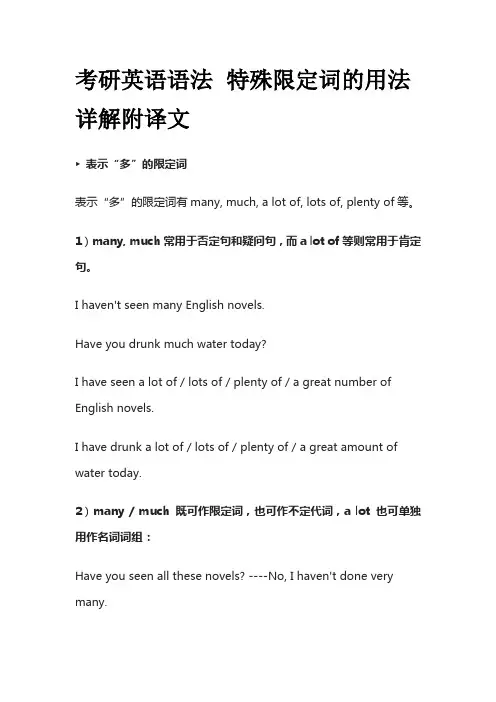
考研英语语法特殊限定词的用法详解附译文►表示“多”的限定词表示“多”的限定词有many, much, a lot of, lots of, plenty of等。
1)many, much常用于否定句和疑问句,而a lot of等则常用于肯定句。
I haven't seen many English novels.Have you drunk much water today?I have seen a lot of / lots of / plenty of / a great number of English novels.I have drunk a lot of / lots of / plenty of / a great amount of water today.2)many / much 既可作限定词,也可作不定代词,a lot 也可单独用作名词词组:Have you seen all these novels? ----No, I haven't done very many.You have done a lot for me.►表示“少”的限定词表示“少”的限定词有(a) few, (a) little。
1)a few, a little表示"少量",带有肯定意义。
Let's invite a few friends to our party.I had a little difficulty in reading this poem.2)few / little表示否定意义,相当于not many / much, not enough。
I have very few pens left. Could you give me some more.There is little food in the fridge. Let’s go to the supermarket.3)quite a few, a good few, not a few表示“相当多”。
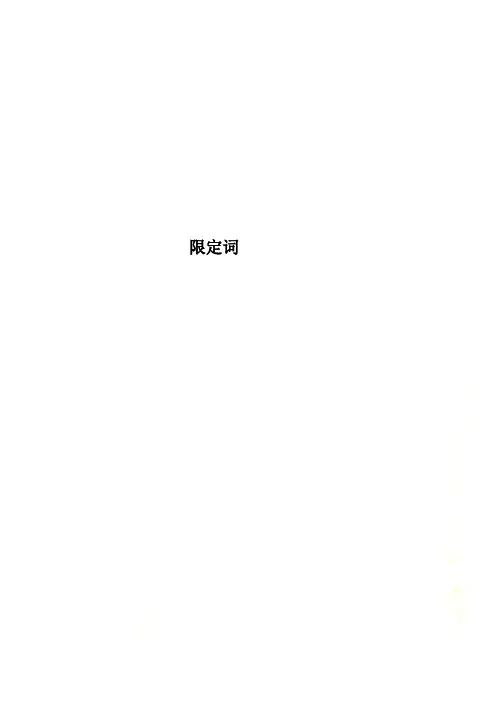
限定词一、限定词的概念限定词(determiner)是在名词词组中对名词中心词起特指(specific reference)、类指(generic reference)以及表示确定数量(definite quantity)和非确定数量(indefinite quantity)等限定作用的词类。
名词词组除有词汇意义外,还有其所指意义(referential meaning),是特指(即指特写的对象),还是类指(即泛指一类人或物);是有确定的数量,还是没有确定的数量。
能在名词词组中表示这种所指意义的词类就是限定词。
二、限定词包括哪些词定冠词(defintite article):the;不定冠词(indefintite article):a, an;零冠词(zero article)物主限定词(possessive determiner):my, your, his, her, our, your, their, one's, its;名词属格(genitive noun):Tom’s, my mother’s;指示限定词(demonstrative determiner):this, that, these, those, such;关系限定词(relative determiner):whose, which;疑问限定词(interrogative determiner):what, which, whose;不定限定词(indefintite determiner):no, some, any, each, every, enough, either, neither, all, both, half, several, many, much, (a) few, (a) little, other, another;基数词(cardinal numeral):one, two, three, four, five…;序数词(ordinal numeral):first, second, third, fourth, fifth…;倍数词(multiplicative numeral):o ne third, two thirds…;分数词(fractional numeral):twice, three times…;量词(quantifier)a lot of, lots of, plenty of, a great of, a good deal of, a large of, a small amount of, a quantity of, a great of, a good number of…。
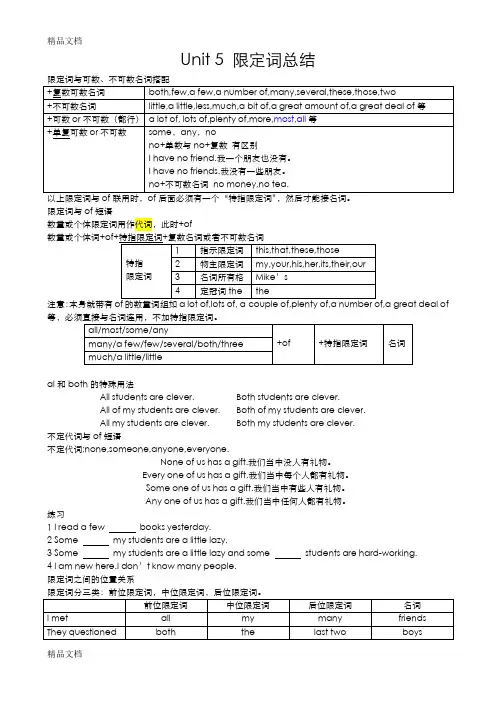
Unit 5 限定词总结限定词与可数、不可数名词搭配+复数可数名词both,few,a few,a number of,many,several,these,those,two+不可数名词little,a little,less,much,a bit of,a great amount of,a great deal of等+可数or不可数(都行)a lot of, lots of,plenty of,more,most,all等+单复可数or不可数some,any,nono+单数与no+复数有区别I have no friend.我一个朋友也没有。
I have no friends.我没有一些朋友。
no+不可数名词no money,no tea.以上限定词与of联用时,of后面必须有一个“特指限定词”,然后才能接名词。
限定词与of短语数量或个体限定词用作代词,此时+of数量或个体词+of+特指限定词+复数名词或者不可数名词特指限定词1 指示限定词this,that,these,those2 物主限定词my,your,his,her,its,their,our3 名词所有格Mike’s4 定冠词the the注意:本身就带有of的数量词组如a lot of,lots of, a couple of,plenty of,a number of,a great deal of 等,必须直接与名词连用,不加特指限定词。
all/most/some/any+of +特指限定词名词many/a few/few/several/both/threemuch/a little/littleal和both的特殊用法All students are clever.All of my students are clever. All my students are clever. Both students are clever. Both of my students are clever. Both my students are clever.不定代词与of短语不定代词;none,someone,anyone,everyone.None of us has a gift.我们当中没人有礼物。
限定词some和any的用法一、some和any的基本区别与用法some和any都是常见的限定词,在英语中用于描述数量或确定性。
尽管它们经常一起使用,但是它们在意义、用法以及语法规则上有一些基本区别。
1. some的用法some表示“一些”或“若干”,常用于肯定句和疑问句中,并且通常指非确切数量。
下面是一些使用some的例子:- Can I have some water? (我能喝点水吗?)- There are some books on the shelf. (书架上有几本书。
)- I met some friends at the party. (我在聚会上认识了几个朋友。
)特别地,当我们想委婉地提出请求或邀请时,也可以使用some:- Would you like to have some coffee? (你想要喝点咖啡吗?)- Could you bring me some tissues, please? (请帮我拿点纸巾好吗?)需要注意的是,some通常只用于肯定句和疑问句中,不可用于否定句。
例如:- I don't have any money. ✘(×)应改为:I don't have any money.2. any的用法any表示“任何”、“无论哪个”或“无论多少”,通常用于否定句、疑问句以及条件从句中。
下面是一些使用any的例子:- I don't have any money. (我没有任何钱。
)- Do you have any plans for the weekend? (你有什么周末计划吗?)- If you have any questions, feel free to ask.(如果你有任何问题,请随时提问。
)在疑问句中,any通常用于表示选择、请求或建议:- Would you like any help? (需要帮忙吗?)- Is there any reason why you're late? (你迟到有什么原因吗?)同时,在否定句和条件从句中,我们也可以使用no而不是any来表达相同的意思。
一、限定词的概念限定词(determiner)是在名词词组中对名词中心词起特指(specific reference)、类指(generic reference)以及表示确定数量(definite quantity)和非确定数量(indefinite quantity)等限定作用的词类。
名词词组除有词汇意义外,还有其所指意义(referential meaning),是特指(即指特写的对象),还是类指(即泛指一类人或物);是有确定的数量,还是没有确定的数量。
能在名词词组中表示这种所指意义的词类就是限定词。
二、限定词包括哪些词定冠词(defintite article):the;不定冠词(indefintite article):a, an;零冠词(zero article)物主限定词(possessive determiner):my, your, his, her, our, your, their, one's, its;名词属格(genitive noun):Tom’s, my mother’s;指示限定词(demonstrative determiner):this, that, these, those, such;关系限定词(relative determiner):whose, which;疑问限定词(interrogative determiner):what, which, whose;不定限定词(indefintite determiner):no, some, any, each, every, enough, either, neither, all, both, half, several, many, much, (a) few, (a) little, other, another;基数词(cardinal numeral):one, two, three, four, five…;序数词(ordinal numeral):first, second, third, fourth, fifth…;倍数词(multiplicative numeral):one thir d, two thirds…;分数词(fractional numeral):twice, three times…;量词(quantifier)a lot of, lots of, plenty of, a great of, a good deal of, a large of, a small amount of, a quantity of, a great of, a good number of…。
英语中的定词定词是英语中一种重要的词汇手段,它用于修饰名词,使其具有特定的含义。
在英语写作中,正确使用定词能够使文章更加精确、清晰,有助于表达作者的意图。
本文将介绍英语中定词的概念、种类、使用技巧以及在写作中的应用,为广大英语学习者提供实用的指导。
1.定词的概念与作用定词,又称限定词,是用来限制或确定名词所指对象数量的词语。
它位于名词之前,起到修饰和限定名词的作用。
常见的定词有:a、an、the、my、your、his、her、its、this、that、these、those等。
通过使用定词,我们可以明确名词所指的对象,避免歧义。
2.英语中定词的种类英语中的定词可分为以下几类:(1)冠词:包括定冠词the和零冠词(无需冠词的情况)。
(2)物主代词:表示某人或某物的,如my、your、his、her、its等。
(3)指示代词:表示近处或远处的事物,如this、that、these、those 等。
(4)疑问代词:用于提问,如which、what、who等。
3.定词的使用技巧在使用定词时,应注意以下几点:(1)根据名词的特定性选择合适的定词。
如果名词具有唯一性,可用定冠词the;如果不具有唯一性,可用零冠词。
(2)在多人或事物并列时,可用物主代词或指示代词区分。
(3)疑问代词用于提问时,需根据语境选择合适的定词。
4.定词在英语写作中的应用在英语写作中,正确使用定词能使文章更具可读性。
以下是一个例子:Badminton is a popular sport in our country.(羽毛球在我们国家是一项流行的运动。
)在此句中,定词“our”限定了“country”的范围,使句子更加明确。
5.提高定词使用水平的建议要提高定词使用水平,可以采取以下方法:(1)多读英语文章,观察优秀作家如何使用定词。
(2)练习写作,有意识地使用定词,并注意检查是否恰当。
(3)学习英语语法,掌握定词的用法和规律。
总之,英语中的定词是写作中不可或缺的元素。
限定词总结限定词总结限定词是英语语法中的一种重要词类,用于修饰名词或代词,限定其范围或数量。
本文将从定义、分类、用法和注意事项四个方面进行详细介绍。
一、定义限定词(determiner)是指用来修饰名词或代词的一类词汇,它们可以限制名词的范围、数量和指向等。
通常出现在名词前面,也可以出现在名词短语的头部。
二、分类1. 定冠词(definite article)定冠词“the”是最常见的限定词之一,表示特指某一个事物或人。
例如:The book on the table is mine.(桌子上那本书是我的。
)2. 不定冠词(indefinite article)不定冠词“a”和“an”表示泛指某一个事物或人。
其中,“a”用于辅音开头的单数可数名词,“an”用于元音开头的单数可数名词。
例如:An apple a day keeps the doctor away.(每天吃一个苹果,医生远离我。
)3. 代替性限定词(substitute determiner)代替性限定词包括:one, ones, some, any, each, every, either, neither, both, all, few, several等。
它们可以代替名词,表示数量、指向或选择。
例如:Some of the students are absent today.(今天有些学生缺席了。
)4. 指示性限定词(demonstrative determiner)指示性限定词包括:this, that, these, those等。
它们用来指示名词所代表的事物或人的位置、距离和数量。
例如:This is my car.(这是我的车子。
)5. 形容词性限定词(adjective determiner)形容词性限定词包括:my, your, his, her, its, our, their等。
它们与名词一起构成形容词短语,表示所有格或所属关系。
Unit 5 限定词总结限定词与of短语数量或个体限定词用作代词,此时+of数量或个体词特指限定词注意:本身就带有al和both的特殊用法All students are clever.All of my students are clever. All my students are clever. Both students are clever. Both of my students are clever. Both my students are clever.不定代词与of短语不定代词;none,someone,anyone,everyone.None of us has a gift.我们当中没人有礼物。
Every one of us has a gift.我们当中每个人都有礼物。
Some one of us has a gift.我们当中有些人有礼物。
Any one of us has a gift.我们当中任何人都有礼物。
练习1 I read a few books yesterday.2 Some my students are a little lazy.3 Some my students are a little lazy and some students are hard-working.4 I am new here.I don’t know many people.限定词之间的位置关系限定词练习1) My shoes have been worn out. I'll have to buy______.A) some new pair B) a new oneC) some new ones D) a new pair2) If ______letter arrives for me, can you send it to this address?A) no B) someC) any D) some more3)Taxes and death may come to______, but they never come with impartiality.A) all men B) all of manC) all men D) all of men4)Miss Green contributed fifty dollars, but she wished she could contribute______.A) one other fifty dollars B) the same amount alsoC) more fifty dollars D) another fifty5)Our monitor is always ready to do good to______.A) the other B) the othersC) other D)others6)______of them knew about the plan because it was secret.A) Some B) AnyC) No one D) None7)There is very ______hope that he will survive the car accident.A) few B) a fewC) much D) little8)I have two brothers. One is a scientist; ______is an artist.A) another B) the otherC) others D) the others9)On Sundays, they often go to ______to hear music.A) a churchB) the churchC) church D) some churches10) Do you have ______coffee left?A) some B) any C) any of D) a lot11) Hand in a composition every ______week, please.A) some B) otherC) others D) another12)Even if they are on sale, these shoes are equal in price to ______,if not more expensive, at the other store.A) anyone B) the othersC) that D) the ones13) If we continue to argue over minor points, we won't get ______near a solution.A) somewhere B) nowhereC) anywhere D) elsewhere14)Some will water the apple trees, ______will weed the cotton fields.A) another B) the otherC) the others D) other15)We must make use of contradictions, win over the many, oppose______.A) the little B) the fewC)a little D) a few16)Ramon burned the roast. He didn't want to tell Betty about______, so he bought______.A) them; more one B) it; the otherC) one; the others D) it; another one17) Two people had met the general before, but ______recognized him.A) either B) neitherC) any D) some18) I have read ______you lent me.A) all of books B) the all booksC) all the books D) whole the books19) We are so glad that we have reaped ______harvest this year.A) the other B) anotherC) other D) the another20)I have had enough cake. Would you like______?A) one more B) some moreC) any more D) another one21)______child will find his own personal road to success.A) Every B) EachC) Some D)The22)I have classes ______day—Mondays, Wednesdays and Fridays.A) each B) every otherC) this and the other D) all other23) There was ______food left, though we all got hungry.A) little B) a littleC) a few D) few24)I haven't finished reading that French book, ______has my friend.A) so B) neitherC) also D) as well25)Some people prefer classical music, while ______prefer rock music.A) other B) the otherC) another D) others限定词部分练习题1)D 2)C 3)C 4)D 5)D 6)D 7)D 8)B9)C 10)B 11)B 12)D 13)C 14)C 15)B 16)D 17)B 18)C 19)B 20)B 21)B 22)B 23)A 24)B 25)D。